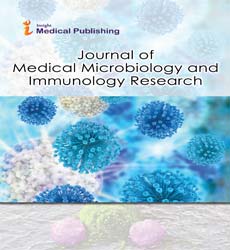ISSN : 2634-7164
Journal of Medical Microbiology and Immunology Research
Host-parasite Relationship is Critical to Understand Immune Response against Parasite Infection
Andre LA Dos-Santos*
Institute of Medical Biochemistry Leopoldo De Meis, Federal University of Rio de Janeiro, Rio de Janeiro, Brazil
- *Corresponding Author:
- Andre LA Dos-Santos
Institute of Medical Biochemistry Leopoldo De Meis
Federal University of Rio de Janeiro
Rio de Janeiro, Brazil
Tel: +552139386789
E-mail: alasantos@bioqmed.ufrj.br
Received Date: Sept 29, 2017; Accepted Date: Oct 03, 2017; Published Date: Oct 11, 2017
Citation: Dos-Santos ALA (2017) Host-parasite Relationship is Critical to Understand Immune Response against Parasite Infection. J Med Microbiol Immunol Res 1:e101.
Copyright: © 2017 Dos-Santos ALA. This is an open-access article distributed under the terms of the Creative Commons Attribution License, which permits unrestricted use, distribution, and reproduction in any medium, provided the original author and source are credited.
Editorial
Myeloid cells are part of the innate immune system, which includes neutrophils, basophils, eosinophils, mast cells, and natural killer cells. Monocytes, macrophages and dendritic cells (DCs) are part of the mononuclear phagocyte system (MPS) and play an important role in control of disease, but can contribute to the establishment of persistent infections [1,2].
The MPS is the first line of defense against infections agents and provide an immediate defense against infections in tissues. The MPS respond to parasites through germlineencoded host receptors that recognize pathogen patterns (PRRs) and their respective pathogen-associated molecular patterns (PAMPs). In addition, they are responsible for confer specificity to the host innate system by activation of Toll-like receptors (TLRs). For example, different classes of DCs recognize microbial molecules via TLRs and respond to PRRs according to their TLR expression [3,4].
At the same time, parasites are able to developed mechanisms to escape the host immune response. These mechanisms allow the resistance of the parasite to immune response and lead to a successful infection process.
In Trypanosoma cruzi plasma membrane associated transsialidase enzyme is involved in parasite survival in the vertebrate host by invasion and escape from phagolysosomes. Furthermore, trans-sialidase enzymes are stage-specific molecules and it has different roles in parasite internalization. For example, GP82 induces biogenesis of the parasitophorous vacuole and host cell invasion [5].
Trypanosoma brucei present a system of antigenic variation that changes frequently the surface antigens and allows the parasite to evade the immune system recognition and humoral response. The antigenic variation is generate by mutation or recombination and challenges the immune system continually by new epitopes. In addition, the antigenic variation determinate whether human can be infected. For example, T. brucei and T. brucei congolense are unable to infect humans. In contrast, T. brucei rhodesiense and T. brucei gambiense are able to lead to a fatal disease due to the proliferation of parasites in the blood and tissues [6].
In the case of Leishmania sp., this parasite has a great evasion strategy. This protozoan is able to suppress the microbicidal functions of macrophages by altering signaling pathways. Leishmania suppress macrophage activity by modulation of expression of cytokines, production of nitric oxide and reactive oxygen species and reduction of antigen presentation [7].
In order to survive, Plasmodium falciparum have to change its surface antigens in each phase of live cycle. This way, the expression of membrane surface proteins is stage-specific and tends to be highly polymorphic and antigenically variable [8].
The most relevant characteristic of Entamoeba histolytica is its cytolytic activity. This protozoan contains hydrolytic enzymes and cysteine proteases that damage host cells and tissues. The proteases interfere with the humoral immune response by degradation of IgA and IgG antibodies. The E. histolytica is also able to escape the lytic effect of complement and the inflammatory response by inactivation of C3 and C5a mediators [8].
In summary, more studies of parasite antigens must be done to identify specificity for each parasite and to clarify the immune response against different parasites. This is critical to development of new methods to control of disease in endemic areas.
References
- Dos-Santos ALA, Carvalho-Kelly LF, Dick CF, Meyer-Fernandes JR (2016) Innate immunomodulation to trypanosomatid parasite infections. Exp Parasitol 167: 67-75.
- Sheel M, Engwerda CR (2012) The diverse roles of monocytes in inflammation caused by protozoan parasitic diseases. Trends Parasitol 28: 408-416.
- Finberg EK (2015) Ironing out the role of Toll-like receptors. Blood 125: 2183-2184.
- Kumar H, Kawai T, Akira S (2011) Pathogen recognition by the innate immune system. Int Rev Immunol 30: 16-34.
- Bayer-Santos E, Cunha-e-Silva NL, Yoshida N, Franco da Silveira J (2013) Expression and cellular trafficking of GP82 and GP90 glycoproteins during Trypanosoma cruzi metacyclogenesis. Parasit Vectors 6: 127.
- Higgins MK, Tkachenko O, Brown A, Reed J, Raper J, et al. (2013) Structure of the trypanosome haptoglobin-hemoglobin receptor and implications for nutrient uptake and innate immunity. Proc Natl Acad Sci USA 110: 1905-1910.
- Isnard A, Christian JG, Kodiha M, Stochaj U, McMaster WR, et al.(2015) Impact of Leishmania infection on host macrophage nuclear physiology and nucleopore complex integrity. PLoS Pathog 11: e1004776.
- Zambrano-Villa S, Rosales-Borjas D, Carrero JC, Ortiz-Ortiz L (2002) How protozoan parasite evade the immune response. Trends Parasitol 18: 272-278.
Open Access Journals
- Aquaculture & Veterinary Science
- Chemistry & Chemical Sciences
- Clinical Sciences
- Engineering
- General Science
- Genetics & Molecular Biology
- Health Care & Nursing
- Immunology & Microbiology
- Materials Science
- Mathematics & Physics
- Medical Sciences
- Neurology & Psychiatry
- Oncology & Cancer Science
- Pharmaceutical Sciences
